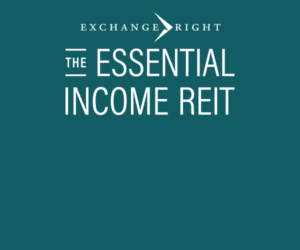ExchangeRight’s Formula for Success in Private Placements
February 17, 2020 | ExchangeRight Real Estate
 Geoffrey D. Flahardy serves as ExchangeRight’s co-director of national accounts, private placement specialist, and senior vice president, focusing on the Eastern Region and national accounts, developing new product sales and new broker-dealer relationships for the company’s private placement offerings since 2014. He holds Series 7 and 63 licenses with the Financial Industry Regulatory Authority (FINRA).
Geoffrey D. Flahardy serves as ExchangeRight’s co-director of national accounts, private placement specialist, and senior vice president, focusing on the Eastern Region and national accounts, developing new product sales and new broker-dealer relationships for the company’s private placement offerings since 2014. He holds Series 7 and 63 licenses with the Financial Industry Regulatory Authority (FINRA).
ExchangeRight Real Estate and its affiliates have experienced growing national demand for their offerings. The company stewards over $2.4 billion in assets under management as of January 31, 2020. Under the leadership of David Fisher, Joshua Ungerecht, and Warren Thomas, ExchangeRight began placing investor equity into 1031 exchange-eligible investment offerings in 2012. Warren and Joshua had identified a strong need for capital preservation and recession-resistant cash flows among their clients. Observing the effects of the Great Recession, they found that net operating incomes generally did not drop among long-term net-leased property backed by investment-grade corporations, specifically in the necessity retail and healthcare industries. These assets weathered the last recession significantly better than other commercial real estate asset classes.
A private 1031 exchange-eligible investment offering of this type may be appropriate for accredited investors who own appreciated commercial real estate and need to defer capital gains taxes, diversify, accomplish estate planning goals, and provide current income. The Delaware Statutory Trust (DST) is an investment structure that can serve such investors. A DST can combine the capital of many passive investors for holding a diversified portfolio of passive income-producing real estate assets. Furthermore, it can be eligible for use in tax-deferred 1031 exchanges. As a result of combining a 1031 exchange with an investment in a DST, an investor may then dispose of a single, solely owned property and replace it with an interest in a portfolio of properties that combines the equity of many investors to access higher quality tenants, institutional management, and diversification.
Blue Vault recently discussed ExchangeRight’s strategy with Geoff Flahardy, co-director of national accounts. ExchangeRight offers qualified investors opportunities to achieve tax advantages, recession-resistant income, diversification, and a strategic exit plan that is intended to give investors the option to complete a subsequent 1031 exchange, receive cash, or perform a tax-deferred UPREIT transaction under IRC Section 721. In addition to facilitating 1031 exchanges, ExchangeRight’s strategy allows investors the choice to use the 721, or “UPREIT”, option to exchange their DST interests for operating units in an even larger aggregated portfolio called a Real Estate Investment Trust (REIT) that targets long-term, stable, passive cash flow and future liquidity and upside potential through a sale, acquisition, merger, or public listing.
According to ExchangeRight, an investor may combine a 1031 exchange with an eventual 721 exchange if they ultimately want to relinquish a single, solely owned property for interests in a REIT. In a 1031 exchange, an investor defers the capital gains taxes that would otherwise be due on the sale of their investment property if they acquire “like-kind” investment property according to the rules of IRC Section 1031. One important rule is that the replacement property must be acquired with the intent to hold it predominantly for business or investment purposes, rather than for the purpose of residing in it or flipping it for short-term gains.
If an investor uses a 1031 exchange to trade their solely owned investment property for shares in a DST portfolio, meeting the IRS’s safe harbor requirements is no problem. Later, that same DST could be bought by an interested REIT, at which point the investor could be eligible to perform a 721 exchange, whereby they may contribute their DST shares to the appropriate REIT in exchange for operating partnership (OP) units in the REIT. If the assets held by the DST have appreciated significantly during the hold period, the REIT is likely to pay a premium for them, resulting in a step up in valuation for the investor. A higher valuation may translate to higher net cash flow to the investor from the REIT. In summary, with this proposed strategy, an investor may exchange their original property for a share in a DST portfolio, enjoy its cash flow for the duration of the hold period, and then exchange their share in the DST for OP units in an interested REIT. For investors who do not wish to invest in a REIT, they can choose to either complete another 1031 exchange or cash out of the DST when it is sold to the REIT.
In order for an investor to contribute a property to a REIT through an UPREIT transaction, the property must meet the REIT’s investment criteria. Typically, most REITs target and require investments in institutional-grade real estate and require significant scale in order to facilitate such a transaction on behalf of investors. Few individual investors own this type of property and therefore are not able to directly contribute a property to a REIT through a 721 exchange. However, ExchangeRight’s platform allows an investor to 1031 exchange into a DST portfolio that features the kind of high-quality institutional-grade property that a REIT may later want to acquire.
ExchangeRight’s Target Property Investments
Learning from their experiences during the Great Recession, ExchangeRight’s founders have put together diversified portfolios for their 1031-exchangeable DST programs consisting of long-term, net-leased properties backed by investment-grade companies. Their leases typically have initial terms in excess of 10-12 years. They focus on tenants that have operated successfully in the necessity retail and healthcare industries. The properties are diversified geographically in locations with strong demographics and infill population centers. As these leases are backed by investment-grade corporations, or tenants exhibiting investment-grade metrics, and do not have any early termination options, cash flows are better protected for the life of the portfolio.
We are currently in the longest period between recessions in U.S. history. In ExchangeRight’s view, there is an increasing risk of another recession in the near term, and they want their investors to prepare accordingly. The list of tenants ExchangeRight works with illustrates the financial strength and recession-resistance they look for. Tenants like CVS, Dollar General, Tractor Supply, Hy-Vee, Advance Auto, Hobby Lobby, Kroger, Fresenius, Walgreens, AutoZone, Giant Food, Dollar Tree, Napa, Verizon, Family Dollar, and Sherwin Williams all share qualities that ExchangeRight looks for: recession-resilient and necessity-based industries; solid financials that can provide long-term stability and the ability to meet lease commitments; long-term leases that can help to bridge economic downturns; and leases structured to obligate the tenant to pay for the burden of operations, insurance, and property taxes to shield investors from bearing those costs.
ExchangeRight and Its Affiliates’ Capital Raise Across All Offerings
ExchangeRight is a vertically integrated real estate investment firm. In 2019, the combined capital raise of ExchangeRight and its sister company, Telos Capital, was approximately $428 million for DST, REIT, and other private offerings, placing them at 4th place among the 24 reporting private placement sponsors. Telos Capital invests in deeply discounted, value-added, and/or opportunistic real estate that provides significant asymmetry between downside risk and upside potential to protect and grow wealth.











